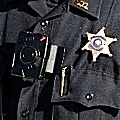- By Marcia E. Lynch
- News
 Print
Print  The Tompkins County Legislature's Public Safety Committee discussed the issue of body cameras for police officers Tuesday, hearing a report from Sheriff Ken Lansing and Undersheriff Brian Robison from their examination of the issue.
The Tompkins County Legislature's Public Safety Committee discussed the issue of body cameras for police officers Tuesday, hearing a report from Sheriff Ken Lansing and Undersheriff Brian Robison from their examination of the issue.Sheriff Lansing told the committee he supports the use of body cameras, which believes would enhance officer safety and capture an actual record of situations and events. But he added that it is critical to have a policy in place regarding how such cameras will be used—including the information technology aspects—before units are purchased and the program is implemented. The Sheriff said he has already consulted with the sheriffs from Schuyler and Niagara Counties, where body cameras are already used, and is reviewing rules and regulations from Niagara County, where the cameras have been in use for about three years.
Undersheriff Brian Robison agreed that for this equipment development of the policy must be the first step.
"This is an emerging issue, emerging technology," with no standard best practices in place, he said.
Needed to be addressed in policy are issues such as storage and retention of the data, and procedures for how and when the cameras are to be used. Robison also noted that camera use must comply with surveillance policies under federal and state law. He said he believes the County may be able to coordinate with the City of Ithaca on policy development, since the City is in the process of procuring body cameras for Ithaca Police officers. He said that secure cloud-based data storage is one data option, which could potentially be less expensive, when potential related personnel cost is considered.
Committee members agreed that having consistency in the body camera program countywide would be desirable, and that the interagency Law Enforcement Technology Shared Services (LETSS) group—in which County and City information technology and all law enforcement agencies are represented—would be the proper venue to coordinate the program.
Sheriff Lansing will return to the committee with a draft policy by its April meeting, with the aim of having a program ready to implement by summer.
v11i7



